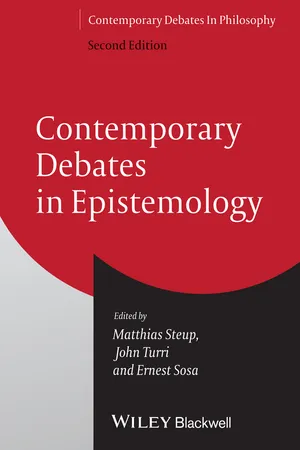
eBook - ePub
No longer available |Learn more
Contemporary Debates in Epistemology
Matthias Steup, John Turri, Ernest Sosa, Matthias Steup, John Turri, Ernest Sosa
This book isn’t in the library right now, search for another
- English
- ePUB (mobile friendly)
- Available on iOS & Android
eBook - ePub
No longer available |Learn more
Contemporary Debates in Epistemology
Matthias Steup, John Turri, Ernest Sosa, Matthias Steup, John Turri, Ernest Sosa
Book details
Table of contents
Citations
About This Book
Fully updated with new topics covering the latest developments and debates, the second edition of this highly influential text retains its unique combination of accessibility and originality.
- Second edition of a highly influential text that has already become a standard in the field, for students and professional researchers alike, due to its impressive line-up of contributors, and its unique combination of accessibility and originality
- Twenty-six essays in total, covering 13 essential topics
- Features five new topics that bring readers up to speed on some of the latest developments in the field, and give them a glimpse of where it's headed: Should knowledge come first? Do practical matters affect whether you know? Is virtuous motivation essential to knowing? Can knowledge be lucky? Can evidence be permissive?
- Substantially updates two other debates: Is there immediate justification? Can belief be justified through coherence alone?
Frequently asked questions
How do I cancel my subscription?
Can/how do I download books?
At the moment all of our mobile-responsive ePub books are available to download via the app. Most of our PDFs are also available to download and we're working on making the final remaining ones downloadable now. Learn more here.
What is the difference between the pricing plans?
Both plans give you full access to the library and all of Perlego’s features. The only differences are the price and subscription period: With the annual plan you’ll save around 30% compared to 12 months on the monthly plan.
What is Perlego?
We are an online textbook subscription service, where you can get access to an entire online library for less than the price of a single book per month. With over 1 million books across 1000+ topics, we’ve got you covered! Learn more here.
Do you support text-to-speech?
Look out for the read-aloud symbol on your next book to see if you can listen to it. The read-aloud tool reads text aloud for you, highlighting the text as it is being read. You can pause it, speed it up and slow it down. Learn more here.
Is Contemporary Debates in Epistemology an online PDF/ePUB?
Yes, you can access Contemporary Debates in Epistemology by Matthias Steup, John Turri, Ernest Sosa, Matthias Steup, John Turri, Ernest Sosa in PDF and/or ePUB format, as well as other popular books in Filosofía & Epistemología en filosofía. We have over one million books available in our catalogue for you to explore.
Information
Table of contents
- Cover
- Praise for Contemporary Debates in Epistemology 2e
- Contemporary Debates in Philosophy
- Title page
- Copyright page
- Notes on Contributors
- Preface to the Second Edition
- Preface to the First Edition
- Chapter One: Should Knowledge Come First?
- Chapter Two: Is Knowledge Closed under Known Entailment?
- Chapter Three: Is Knowledge Contextual?
- Chapter Four: Do Practical Matters Affect Whether You Know?
- Chapter Five: Can Skepticism Be Refuted?
- Chapter Six: Are Intellectually Virtuous Motives Essential to Knowledge?
- Chapter Seven: Can Knowledge Be Lucky?
- Chapter Eight: Is There a Priori Knowledge?
- Chapter Nine: Is There Immediate Justification?
- Chapter Ten: Can Belief Be Justified Through Coherence Alone?
- Chapter Eleven : Is Infinitism the Solution to the Regress Problem?
- Chapter Twelve: Can Evidence Be Permissive?
- Chapter Thirteen: Is Justification Internal?
- Chapter Fourteen : Is Truth the Primary Epistemic Goal?
- Index